Welcome to Matrix Education
To ensure we are showing you the most relevant content, please select your location below.
Select a year to see courses
Learn online or on-campus during the term or school holidays
Learn online or on-campus during the term or school holidays
Learn online or on-campus during the term or school holidays
Learn online or on-campus during the term or school holidays
Learn online or on-campus during the term or school holidays
Learn online or on-campus during the term or school holidays
Learn online or on-campus during the term or school holidays
Get HSC Trial exam ready in just a week
Get HSC exam ready in just a week
Select a year to see available courses
Science guides to help you get ahead
Science guides to help you get ahead

The final countdown to the HSC is a stressful situation under the best of conditions. What’s important in the final month is making the most of the study time you have available and not wasting it with indecision, anxiety, or procrastination. To help you stay focused and on track we’ve put together this 28 day HSC Maths study plan and downloadable study planning kit. Read this and the other Guides in the series and use the planner to get your study on track to Ace your HSC.
Here is a sample calendar that you can base your studies on.
Remember, it is up to you to allocate the necessary time to study for your Maths subject(s). You can choose to spend or less time than what we’ve suggested, or move some activities around.
Also, if you are doing 2 Maths subjects (eg. Maths Adv and Ext 1, or Maths Ext 1 and Ext 2), then you need to figure out how much time you need to spend on each of them. We go through how to rate your subjects based on your confidence level and your internal ranking in our Overview: Get HSC Ready in 28 Days.
Boost your HSC Trial Exam marks
Get 4 full mock exams with detailed solutions to boost your marks. Starts next week!
Note: Bolded activities will take approximately 5-7 hours, whereas unbolded activities should take approximately 30 minutes. These unbolded activities are supposed to be small additional activities that will help you further develop your Maths skills.
| Monday | Tuesday | Wednesday | Thursday | Friday | Saturday | Sunday | |
| Week 1 | Maths preparation Review notes Write exam notes | Memorise formulas | Memorise formulas | Rest and Relaxation | |||
| Week 2 | Revise and memorise formulas Review challenging questions from class and exercises Work through past papers | Seek help on challenging questions Study with friends | R&R | ||||
| Week 3 | 1-2x past paper (exam conditions) 2-3x past papers (untimed, open-book) Review challenging questions Mark answers | Practise challenging questions and mark OR 0.5x past paper for additional maths subject (optional) | Practise challenging questions and mark 0.5x past paper for additional maths subject (optional) | R&R | |||
| Week 4 | 2-4x past papers (exam conditions) Review challenging questions Mark answers Review notes | Practise challenging questions and mark Seek help | Review challenging questions 1x past paper for additional maths subject (exam conditions) | Review notes | R&R |
Before we go into your 28 Day HSC Maths study plans, we need to do some housekeeping!
We go through these steps in detail in our Overview of the 28 Day HSC Study Planner Guide.
Get HSC ready in just 28 days and maximise your exam marks! Fill out your details below to get this resource emailed to you. "*" indicates required fields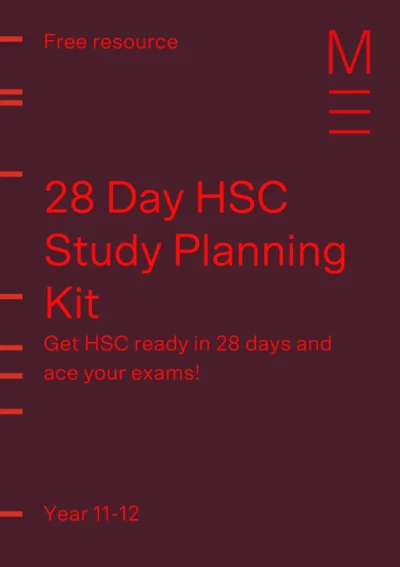
Download your 28 day HSC Study Planning Kit

Download your 28 day HSC Study Planning Kit
This week is all about preparing your notes and refamiliarising yourself with HSC Maths content.
It is crucial that you do this because it ensures that you don’t have any missing gaps of knowledge and that you know exactly what to expect when you enter the exam.
Next section: Revision and Quiz
NESA’s Maths syllabus clearly identifies which topics, sub-topics, content and formulas that you will be assessed in your HSC exams.
Take a look for yourself:
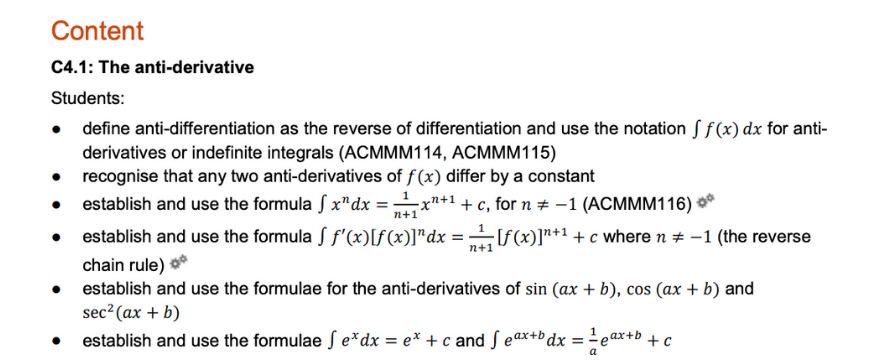
This means that identifying missing gaps of knowledge and your strengths and weaknesses will be much easier.
So, you need to:
You can find the syllabus here:
You should already be writing a set of Maths notes throughout the year.
This should include your important formulas and rules, and any other important notes.
Some examples of important notes include maths tricks, easily forgettable information (eg. ‘+C’ in integration solutions, or units like ‘cm’ or ‘mm’) and solutions to challenging questions.
If you haven’t been writing these notes throughout the year, don’t fear! We’ll simply review your class notes and write exam notes (in Step 5)
So, let’s see how we can organise and review our Maths notes and/or class notes:
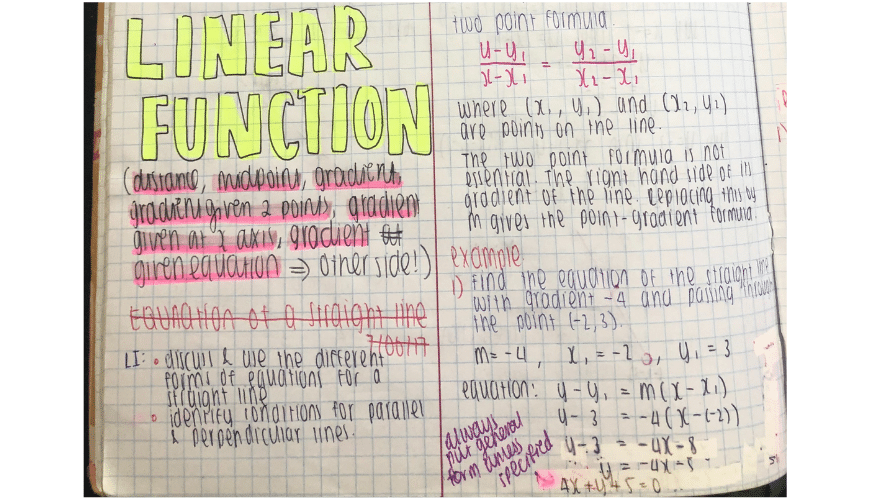
Notice how it includes important formulas (in pink), a detailed explanation of the formula (in black), examples and their solutions (in blue and black), and additional important notes (in purple).
It is important that you know what the Maths exam papers expect you to do.
Pay attention to the:
Here is a list of Maths papers that you should take a look at:
| Maths Adv | Maths Ext 1 | Maths Ext 2 |
|
|
|
Papers from 2018 and earlier are based on the 2009 syllabus, not the newest 2019 syllabus.
However, Maths doesn’t change. So, this is not an excuse to neglect these older papers.
Instead, just skip over questions that aren’t being tested in the new syllabus.
If you have trouble identifying the topic of the question, take a look at the solutions. You may need to scroll a bit until you see a table that looks like this:
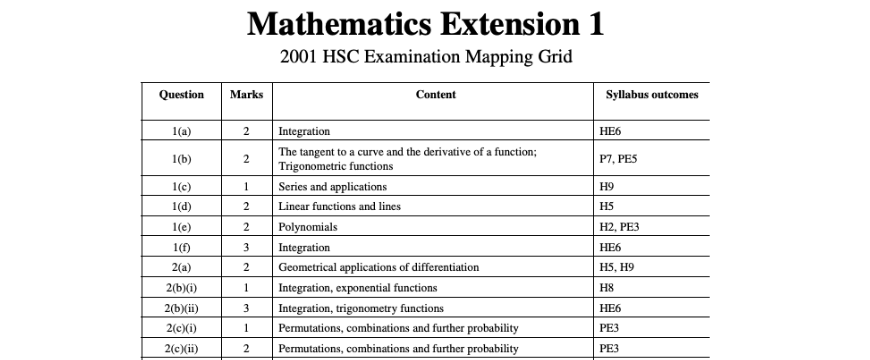
This mapping grid identifies the topic that the question is testing. You will need your syllabus to identify topics that are included in your HSC exams.
So, before you begin working through past papers, simply highlight all the relevant questions based on this table and your syllabus. This way, you’re not switching back and forth between your paper, the solutions and your syllabus.
Note: You will find that more recent Maths exams only includes the syllabus dot point, not the topic. If you have the extra cash to splurge, you can buy an Excel Success One HSC’s textbook. It is a collection of past HSC past papers, solutions and mapping grid with the topic name for every question. If you don’t want to spend that money, you can use your own Maths knowledge to determine the topic that each question is assessing.
For Maths Adv, Ext 1 and Ext 2, students are given a reference sheet to use during the exams. Here is a link to the exact formula sheet that you will be given in your HSC exams: NESA’s Maths reference sheet.
You should always take advantage of this reference sheet and use it during the exam.
It is important that you know exactly what’s included in the reference sheet so you don’t waste your brainpower trying to memorise these. You should also know where everything is placed so you don’t waste precious exam-time flipping through the pages of your reference sheet.
So,
However, this only includes some important formulas, not all.
So, you still need to write your exam notes and memorise the other formulas.
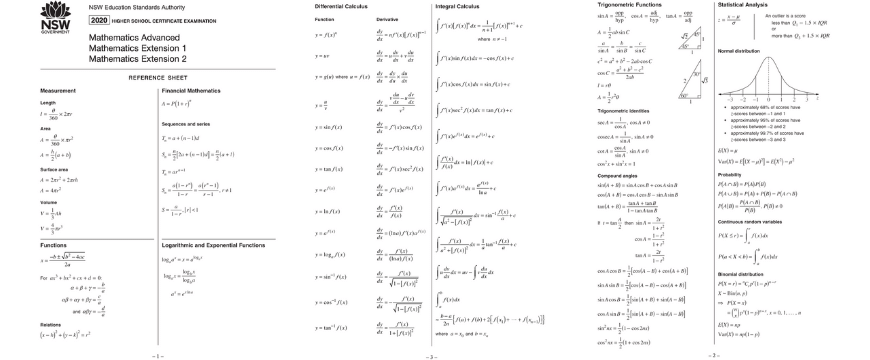
Exam notes are concise notes with all the important information (and no fluff).
You can use your exam notes to memorise key information and rely on them when you are working through open book past papers.
If you’ve been writing simple and concise Maths notes throughout the year, then these will work as exam notes!
Below is an example of a Matrix student’s Maths notes that they’ve been writing throughout the year. See how they are concise, simple and only contain the most important information?
These can be used as exam notes too!
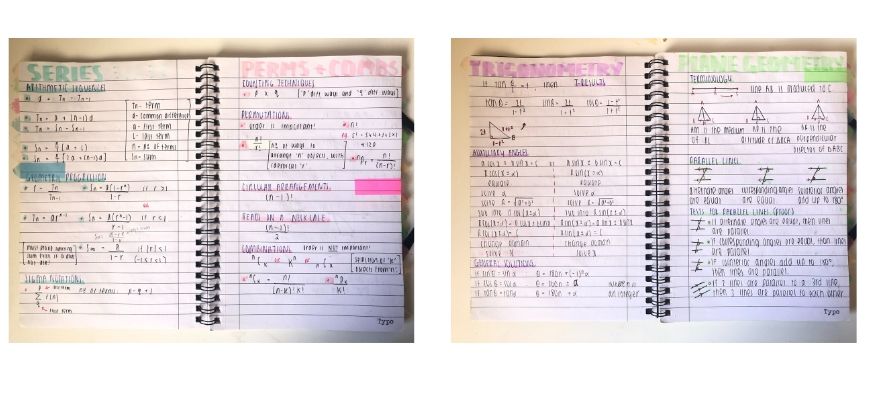
They’ve included:
These are the information you should be including in your Maths exam notes!
Now, let’s compare these with a Matrix student’s class notes that they’ve been writing throughout the year.
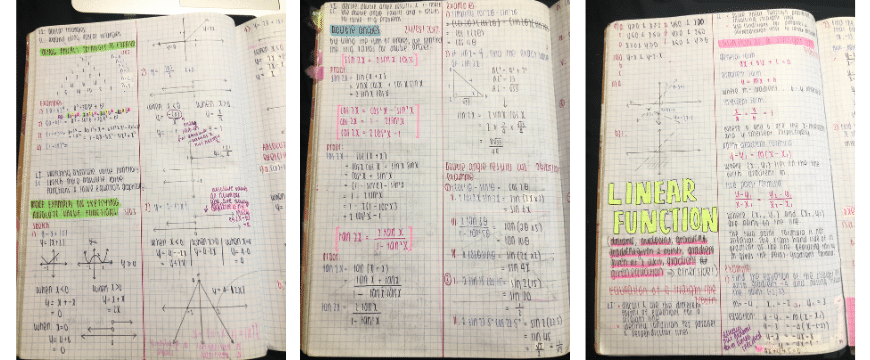
These notes are much more detailed and the important information are spread across a large chunk of pages.
Using these notes as your exam notes is inefficient because you will waste more time looking for the right formula rather than studying.
By now, you would have identified your weaknesses and confusing areas as you went through the syllabus and your notes.
It’s crucial that you deal with these issues immediately so you have time to practice them!
Also, many Maths questions require you to apply different concepts to solve them. So, if you are lacking in one area, this may jeopardise your ability to fully answer the question.
So, how do you identify your weaknesses:
Once you’ve figured these weaknesses, you need to:
Throughout the week, attempt to spend 10-15 minutes here and there to memorise your Maths formulas and rules.
When you do this early, you are able to memorise them off by heart because you’ll continually recall them as you work through past papers.
Here are some tips to help you remember them:
This week is all about consolidating your understanding and dipping your feet to test the waters!
You should have already begun memorising formulas and reviewing examples last week. Now, we are finalising this and beginning to work through part papers
Prepare for HSC Trials in 6 days
6 structured lessons taught by HSC experts. Starts next week - spots filling fast!
It’s okay if you haven’t finished memorising all of your formulas yet. Spend some time to get it done today.
Once you are confident that you memorised all of the formulas, you should quickly scan through:
Last week, you reviewed challenging questions by reading and understanding their solutions. This week, we will take this a step further.
You should:
This step is a quick test to see how well you remember the formulas and your ability to apply them.
Don’t start stressing! We aren’t doing this under exam conditions.
So, to do this, you need to:
Ensure that you are always tracking your common mistakes so you can work on them!
When you continue to expose yourself to a wide variety of questions, you will find more weak areas.
Don’t neglect them. Work on them straight away!
So, continue to target these weak areas by using the methods we aforementioned:
Remember, your HSC journey is not supposed to be a lonely one! You have your friends who are on the same journey as you!
Take advantage of this and work together with your friends to improve in Maths.
You can call or meet up with your friends and:
Teaching others is one of the best ways to learn. Why?
Well, when you teach people, you are testing your understanding of the concept. If you are struggling to explain a concept, then that means that you don’t have a strong enough understanding of it.
Teaching people also helps you consolidate and better memorise Maths concepts as you are expected to verbalise it.
You can extend your understanding of your content, especially when your friend asks you challenging questions.
Now that we’ve revised and targeted our weaknesses, it is time to complete some past papers!
Next section: Revision and Past Papers
This is a rough guide of what you should aim to complete:
| Maths Paper |
|
Obviously, if you are doing more than 1 Maths subject (eg. Maths Adv and Ext 1, or Ext 1 and Ext 2) then you need to allocate your time according to your study needs.
Increase or decrease the number of past papers you do for your Maths subject(s), and/or move your studies around to make time for your needs.
For example, if you feel like your Monday studies weren’t enough for both of your Maths subjects, then you can do an additional Maths paper over the whole week.
Does the sound of doing past papers under exam conditions stress you out a little? Well, this is why we need to do them!
Completing past papers under exam condition will help you deal with exam stress and develop your exam-taking skills.
Some benefits of this include:
So, let’s see what ‘exam-conditions’ mean:
Aim to complete at least one past paper for each of your Maths subjects throughout the week.
If you are low on time, then you can break the exam up in 1 hour or 1.5 hour sessions. Remember to complete them under exam conditions!
Open book past papers are, similarly, highly beneficial to do too! Each has their own different advantages, so aim to complete a variety of the two.
Let’s see the benefits of open-book exams:
So, how do we complete an open book exam?
Try to complete all the questions in your past papers. Treat this step as a learning opportunity to fine-tune and develop your Maths skills.
Once you’ve completed a significant amount of open book past-papers, then you can start skipping easy questions and focus on the intermediate and challenging questions.
After working through a good amount of past papers, – both under exam conditions and open book – you should start to solely focus on challenging questions.
These are usually question types that you tend to answer incorrectly or questions that test your subject weaknesses.
To do this, you should:
Remember, if you need help identifying challenging questions from the textbook, just go to the solutions to find the mapping guide (for older past papers). Select the questions from your weaker topics and work on them.
Always remember to mark your work and seek help if you need it!
It is very important that you are continually targetting your issues and weaknesses.
If you are unable to understand the provided solution and explanation, then seek help!
Ask your friends who are confident in the topic, your school teachers and your Matrix teachers. Remember to be polite when asking.
Get 24/7 help for HSC Trial Prep
Get instant support with Ask Max your AI study buddy, included in your HSC Trial Prep course. Starts next week!
There’s one week left before your HSC exams! We will be doing more past papers to acquaint you with a wide variety of questions and quickly revising over all your formulas, so they are all fresh in your mind!
Even if you don’t feel 100% ready to do a practice paper under exam conditions, it’s important that you push yourself to do it! It’s all for practice after all, so don’t be stressed out by what you might score, but rather, appreciate what you might learn from this. You will be surprised how much you actually remember!
Doing past papers is great practice, but it can be very time-consuming — Maths Ext 1 HSC exams are 2 hours long, while Maths Adv and Math Ext 2 are 3 hours!
At the pointy end of your exam preparation, you may find that there’s not enough time to do all practice papers. So, it can be particularly time-saving to pick out challenging questions from practice papers to save you from spending hours doing the whole thing, while still ensuring that you continue to learn.
In saying that, it’s important to also develop your exam technique by doing some full practice papers. Long story short, do some full practice papers under exam conditions and pick out challenging questions from the rest!
Maths is all about understanding formulas, theorems and their applications. If you can’t even remember a formula, it’s unlikely that you will be able to use it to solve problems where their application may not be entirely obvious from the start.
That’s why you must allocate time to review your notes of these formulas and their possible applications. However, keep in mind that many formulas are included on the Maths reference sheet, which will be available to you during all your HSC exams.
If you completely rely on using this reference sheet and constantly refer to it during your HSC exam, you will likely run out of time. But, it is a great backup if you happen to forget something or one formula just won’t stick in your memory.
You are working super hard, so it’s important to take a break sometimes! Chill out, chat with friends and family, and get out for some fresh air. Trust us, it will maximise your productivity and help you procrastinate less!
© Matrix Education and www.matrix.edu.au, 2025. Unauthorised use and/or duplication of this material without express and written permission from this site’s author and/or owner is strictly prohibited. Excerpts and links may be used, provided that full and clear credit is given to Matrix Education and www.matrix.edu.au with appropriate and specific direction to the original content.